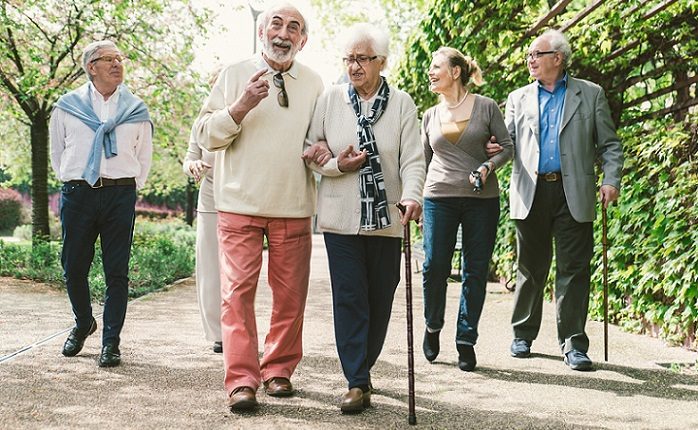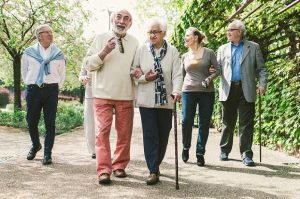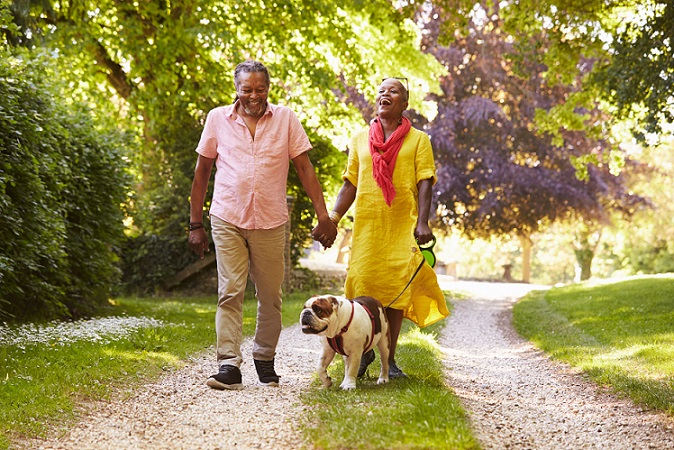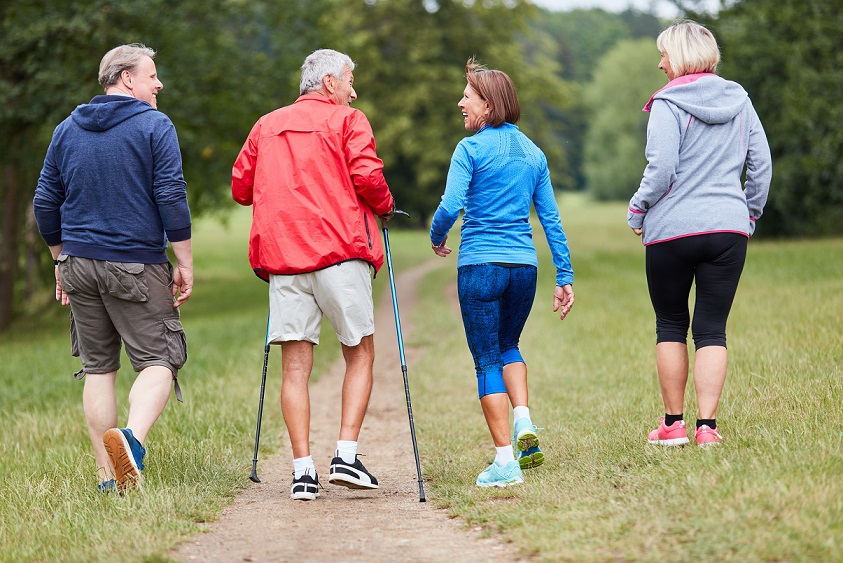
Benefits of Walking for Seniors: A free Way to a Better Life
Did you know the first Wednesday in April is National Walking Day? You might ask if walking is important enough to have its own day, and the answer is yes. Absolutely.
Walking is a cure for most health-related issues. Numerous studies have focused on walking, and they have all concluded that 20 to 40 minutes of walking a day would decrease the mortality rate by up to 50 percent. Walking is a safe and accessible exercise that requires no specific talent or equipment but a good pair of shoes.
When walking, the body bears its weight, which is an endurance exercise. This article will investigate the effects of walking on reducing the risk of death for older adults.
Walking also prevents numerous diseases and strengthens memory. The following list presents the effects of walking on seniors’ health and well being:
Although we highly recommend walking for seniors, we caution against running, particularly if you have heart disease. Want to know more about Suitable sports for seniors, Read here.
Weight Control
Walking and maintaining a healthy diet can help the elderly stay on average weight. Several common conditions among people over 65 are related to obesity, and walking can considerably affect your weight. Walking will help prevent type II diabetes, heart diseases, stroke, cancer, etc.
More Resources: Best Foods to Prevent Cancer in Old Age
Heart Attack Prevention
Exercises such as walking for 30 minutes a day can reduce heart attack possibility up to 30-40 percent.
Blood Pressure Control
Walking strengthens the heart, and as a result, the heart can pump more blood with less effort and pressure.

Cholesterol Reduction
Regular, daily physical activity lowers harmful blood cholesterol levels. This harmful cholesterol is the leading cause of diseases and heart attacks.
Gallstone Prevention
Gallstone formation is one of the main issues that the elderly are suffering from. In some cases, due to the elderly having some other health-related issues, it is impossible to do surgery to remove the gallstone. Studies show that regular walking or other physical activity reduces gallstone surgery risk by 20 to 31 percent.
Improving Heart
Walking helps improve heart health. Walking is the best exercise for sedentary people, especially adults, to reduce cardiovascular disease risk.
Strengthening Muscles
Aging causes the person to lose muscles. Walking can strengthen the muscles, and it is the best strategy to prevent muscle loss. Regular walking is good for your back and leg muscles.
Diabetes Control
A sedentary lifestyle leads to developing one of the most common diseases, diabetes. Walking every day can help control blood sugar levels, which helps prevent type 2 diabetes.
Improving Bone Health
Seniors’ Bones become weaker with age, and regular walking will gradually strengthen your bones. As a result, it reduces the risk of osteoporosis, fractures, and injuries. Because bones determine our framework, more powerful and healthier bones help improve strength, endurance, and balance. Walking can also prevent arthritis and reduce pain.
Depression Prevention
Depression is one of the most common conditions the elderly suffer from, and loneliness is the leading cause of depression. Walking (especially walking with a group of friends) can prevent depression.
Improving Blood Circulation
Walking can increase your brainpower. Walking nourishes the brain with the required amounts of oxygen and glucose and helps it function better. It also lowers bad cholesterol, which clogs the arteries and reduces stroke risk. All these factors will result in improved brain circulation and cellular functions.
Improving Digestion
Improper digestion can lead to several problems, such as constipation, diarrhea, colon cancer, etc. Walking along with healthy eating habits and drinking enough water can improve digestion.
Increasing the Capacity of Lungs
Walking can increase the lung capacity of the elderly. When you walk, you breathe more oxygen than when you are not doing any activity. This exchange of oxygen and carbon dioxide in larger volumes can help increase lung capacity. As a result, it increases the strength and performance of the exercise. You do not need to run. An average 60-minute walk can help you achieve your goals.
Delaying the Aging Process

A long-term study conducted on a large group of people doing 30 minutes of walking every day showed that those who walked had delayed their aging process.
Improving Memory
Walking can improve the memory and cognitive abilities of the elderly. Physical exercise helps increase the size of the hippocampus. At the same time, a sedentary lifestyle reduces the hippocampus and leads to memory loss.
Helping with Vitamin D Absorption
Most seniors spend their time at home and do not expose themselves to the sun. That leads to severe deficiency in vitamin D. Sun is the primary source of this essential vitamin, and walking outside can help the elderly avoid such deficiency. Vitamin D is also necessary for bone health, preventing cancer and type I diabetes. It’s best to walk at least 10-15 minutes every day under direct sunlight.
More Resources: The Best Vitamins for the Elderly during Winter
Preventing Dementia
Dementia is a condition in which the person gradually loses his memory and cognitive abilities. Dementia also stops you from doing your daily tasks and makes you dependent on others. Walking at average speed can help the elderly prevent dementia since it improves their memory.
Requirements for Walking

As said earlier, walking is one of the rare exercises that doesn’t require any special tools. To have a better performance, you need a pair of quality shoes suitable for walking, comfortable clothes, a bottle of water, and a towel. Proper shoes are necessary since using uncomfortable shoes makes it challenging to keep walking, but they also cause severe damage to your legs and back.
Where and when?
As mentioned before, it is better to walk outdoors to enjoy your friends’ company and reduce the sense of loneliness. Exercising outside also helps the elderly absorb vitamin D.
However, some seniors cannot leave their houses, so a treadmill would also be the right choice and a nice little reminder for people to keep on exercising.
Do not leave that water bottle in the house!
Drinking enough water while walking is also vital and should not be ignored. If seniors are new to this exercise, they might lose a great deal of the water they have in their bodies, causing dehydration. Not drinking enough water can destroy all the benefits gained by walking. Some people might prefer energy drinks, but most are unsuitable for older adults since the high amount of sugar in these products can be dangerous, particularly for those with diabetes or high blood sugar.
More Resources: How does COVID-19 influence the lives of seniors?

The bottom line is
The health benefits of walking are endless, and it is up to seniors to add walking to their daily schedule and see for themselves if every single advantage listed in this article has been true or not. Remember to come back and write a review of your own unique experience for us.
More Resources:
Sometimes to clear my mind, I take a walk, and after that, I can’t control my craving for sweets and fats. There’s no possible way I can keep a diet when I regularly walk! Walking doesn’t help anyone to lose weight. If anything, it makes people gain more weight. Sure, it’s a great workout and an excellent mood booster, and it decreases specific pains. But the only way walking can help you lose weight is by walking to the gym!
I don’t think eating after walking is for everyone. Maybe that’s something only you do? I walk a lot, and I don’t even feel like eating anything afterwards. People have different types of bodies. And not all exercises work for everyone. But anyway, even if walking doesn’t help us lose weight, it helps us feel better, and I think we’re both in agreement about that.
I am a professional caregiver. And we are told to convince our seniors to walk for at least half an hour a day. It is surprising how many of them don’t want to do that. For some of them, it’s really hard, but they’re exceptions. Most of our seniors are perfectly capable of taking long walks; they just can’t find the energy to do it. I hope they wouldn’t resist it so much since it has a huge effect on their health.
Dear Amber, one of the best solutions for such seniors is asking them to do it with their friends or loved ones if possible. This is because when you have a companion to share the route with, especially the one you can talk to enjoyably, you don’t feel the passage of time or get less tired. It has worked for me, so try it and see the result.
I used to walk every day. I think nothing is more effective than walking for seniors. Because we can control our body metabolism with routine walking. Also, if you feel pain in your knees, you can walk in straight and smooth ways.
To me, walking is like meditation. Whenever I feel depressed or grumpy, I go out, take a walk and pay attention to the details of nature. I hear the sound of birds, children’s laughs and the stream of the water. The point is that I feel less lonely and isolated when I walk and see other people.
I share the same idea with you, Toby. I am 72 years old, and I am generally quite active. I consider walking as yoga to clear my mind and make myself present; whenever I want to get out of a stressful environment and breathe fresh air, I walk. My goal now is around six thousand steps a day. You can build your walking habit by walking with friends or your loved ones. It is a fantastic method that helps me stay motivated to keep walking.
Back in college, I used to walk wherever I wanted to, no matter how far it was. But now my knees are not friendly to me, and I have to sit after 5 minutes of walking, which is a bummer.
Walking is awesome; it has changed my life!
And doing some strength training is also very much recommended.
I am 59, and I do both. I go to the gym and work with a personal trainer every two weeks.
The more you keep up with both, the better.
Some people, of course, cannot afford that, but there are also things on PBS that you can look at.
I think walking alone isn’t enough for our age, but a daily 30-minute walk is a basic recommendation for everyone.
Before Covid, I used to go out for 2 hour walks every day. It was just me, my earphones, and my music playlists. With the help of intermittent fasting and long walks, I lost more than 30 pounds in less than six months. But it wasn’t just about the weight; after the first 2 or 3 months, my feet became stronger and breathing after climbing the subway stairs became much easier. Unfortunately, after the Covid breakout, I stopped these walking sessions entirely. Wearing a mask while going for a long walk in a crowded city was just not possible for me. I can’t wait for the pandemic to be over so that I can go back to my old walking routine.
Walking is a perfect activity with my grandparents or even with the whole family. It improves our mood and is also great for building strength, especially for back and abdominal muscles. Also, You can increase your vitamin d by being outside a couple of times during the week.
I don’t remember the time accurately, but I was diagnosed with diabetes around five years ago. My doctor said if I want to live longer, I really should get off of my coach. Since then, I have gotten up every morning and gone for a 30 minutes walk around my neighbourhood. It changed my life—both physically and emotionally. My mood is better, my health is better, and I have met some incredible people there.
Nothing can compete with walking! It is the mother of all exercises. I spend three hours a day walking in my neighbourhood; it cheers me up, and since I pay attention to details while I walk, it helps me be more focused.